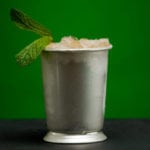 Misconceptions
Misconceptions  Misconceptions
Misconceptions  History
History 10 Amazing Roman Epitaphs
 Weird Stuff
Weird Stuff 10 Niche Subcultures That Are More Popular Than You Might Think
 Mysteries
Mysteries 10 Tragic Disappearances and Deaths in Joshua Tree National Park
 History
History 10 Ways Childhood Really Sucked in the Old West
 Music
Music 10 Name Origins of Famous Bands from the 1990s
 Religion
Religion 10 Biggest Turnarounds by the Catholic Church
 Weird Stuff
Weird Stuff 10 Unbelievable Times Laws Had Unintended Consequences
 Humans
Humans Ten Historic Women Who Deserve Way More Credit Than They Got
 Movies and TV
Movies and TV 10 Films That Spawned Major Lawsuits
 Misconceptions
Misconceptions 10 Phony Myths and Urban Legends That Just Won’t Die
 History
History 10 Amazing Roman Epitaphs
 Weird Stuff
Weird Stuff 10 Niche Subcultures That Are More Popular Than You Might Think
Who's Behind Listverse?

Jamie Frater
Head Editor
Jamie founded Listverse due to an insatiable desire to share fascinating, obscure, and bizarre facts. He has been a guest speaker on numerous national radio and television stations and is a five time published author.
More About Us Mysteries
Mysteries 10 Tragic Disappearances and Deaths in Joshua Tree National Park
 History
History 10 Ways Childhood Really Sucked in the Old West
 Music
Music 10 Name Origins of Famous Bands from the 1990s
 Religion
Religion 10 Biggest Turnarounds by the Catholic Church
 Weird Stuff
Weird Stuff 10 Unbelievable Times Laws Had Unintended Consequences
 Humans
Humans Ten Historic Women Who Deserve Way More Credit Than They Got
 Movies and TV
Movies and TV 10 Films That Spawned Major Lawsuits
10 Bizarre Things You Didn’t Know About Saliva
Ready for a gross fact? On average, your saliva glands produce one to two liters of spit per day. Our teeth are basically swimming in the stuff, but for the most part, we don’t pay much attention to saliva unless it’s flying out of someone’s mouth. And that’s too bad. Sure, spit is disgusting, but it’s really one of the most fascinating fluids on the planet.
10Salivary Gland Stones
Warning: The above video is of a salivary stone removal, and it’s quite gross.
It’s time for a checkup. Is your mouth dry? Do you have pain or swelling in your neck? Any trouble swallowing food? If you answered “yes,” then you might have a salivary stone. Yeah, it’s just as disgusting as it sounds.
Salivary stones (or sialolithiasis) are basically kidney stones in your mouth. Spit is full of calcium, and occasionally it builds up in our salivary ducts, forming pale, crystallized rocks. However, scientists aren’t really sure why this happens. They blame the usual suspects like dehydration, poor eating, and medication, but ultimately, they just don’t know.
In addition to being incredibly nasty, salivary stones are ageist and sexist, as they prefer to afflict adults and males. They can also grow to monstrously huge proportions. While most are just a couple of millimeters, a few unlucky people had seven centimeter (2.8 in) stones lodged in their mouths. That had to be painful, especially since these calcified boulders keep spit from leaving the salivary ducts, leading to inflammation and infection.
What do you do if you’ve got a rock growing in your mouth? That depends on the size of the stone. Small ones can be removed by sucking on sour candies. That activates your glands and gets the raging rivers of spit flowing, flushing the mass free. Occasionally, doctors will give your ducts a massage, gently forcing the blockage out. If the stone won’t cooperate or is too big, a dentist might fire shock waves into your mouth, breaking the structure into little pieces. There’s also a process called sialoendoscopy, which involves a tiny camera and micro-tools. Of course, there’s always traditional surgery, and while it’s relatively painless, it’s definitely disgusting to watch. Enjoy.
9Gila Monster Spit Reduces Food Cravings
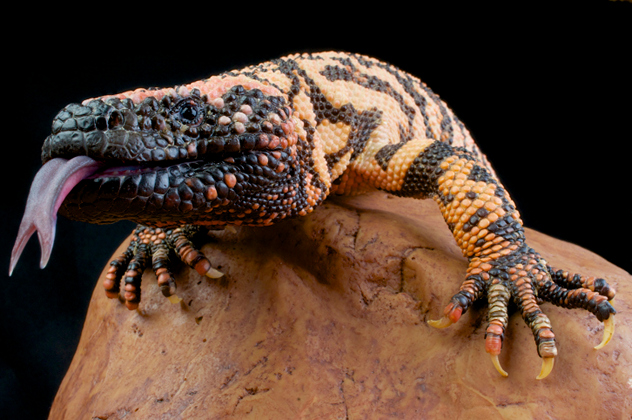
Are you a chocoholic? Lots of people jokingly claim they crave candy, but there are quite a few folks who really suffer from food addiction. Chocolate is jam-packed with sugar and fat: substances that activate reward pathways in our brains, much like illegal substances do. In fact, Yale researchers ran a series of tests showing food addiction is similar to actual drug addiction.
While most of us aren’t food junkies, it’s safe to say we’ve all struggled with food craving or intense guilt after pigging out. However, there might soon be a new way to attack our appetites, thanks to a chunky lizard living in the deserts of North America. The Gila monster is feared for its dangerous bite, but this scaly guy’s saliva might end food addiction forever.
Researchers at the University of Gothenburg, in Sweden, discovered Gila monster spit is full of a compound called exendin-4. Like a drug, exendin-4 affects the reward and motivation regions of our brains. Basically, it satisfies food cravings without any actual food. Scientists discovered its exciting effects by running tests on lab rats (these poor guys have it rough). It’s well known that rodents are voracious eaters, who never pass up a chance for a snack. However, after the rats had a bit of exendin-4, they lost their appetite. Scientists offered them food and chocolate, but the rats weren’t interested. The compound had satisfied their appetite.
Scientists hope that in the future, people who struggle with their diets can pop a lizard spit pill and shed a few kilograms. Exendin-4 also offers another interesting possibility, since the reward and motivation regions also control our desire for drugs and alcohol. Perhaps Gila monster spit can break these addictions as well. However, all this research poses an interesting question . . . who gets the job of swabbing the Gila monster’s mouth?
8Spit Increases Sex Drive

Lots of students think science is boring, but that’s because they’ve never heard of philematology—the study of kissing. Philematologists spend their days studying the art of smooching, and, assuming they’ve got a good lab partner, they probably have a lot of fun. All joking aside, kissing really is an interesting custom. Over 90 percent of human cultures practice kissing, and so do animals like pygmy chimpanzees and bonobos. Even foxes lick each other, and elephants stick their trunks in each others’ mouths. So why is everybody making out?
Kissing releases dopamine, serotonin, and oxytocin, all of which play roles in stirring up passion. However, men have a secret reason for locking lips. According to Rutgers anthropologist, Helen Fisher, men prefer wetter kisses, because their saliva contains trace amounts of testosterone. Over a long period of time (from weeks to possibly years), the testosterone stimulates the woman’s libido, increasing her willingness to have sex. That’s why men often initiate French kissing. They’re subconsciously trying to put their mates in the right mood. “Crash” Davis knew what he was talking about, when he said, “I believe in long, slow, deep, soft, wet kisses that last three days.” That should do the trick.
7Saliva Contains Natural Painkillers
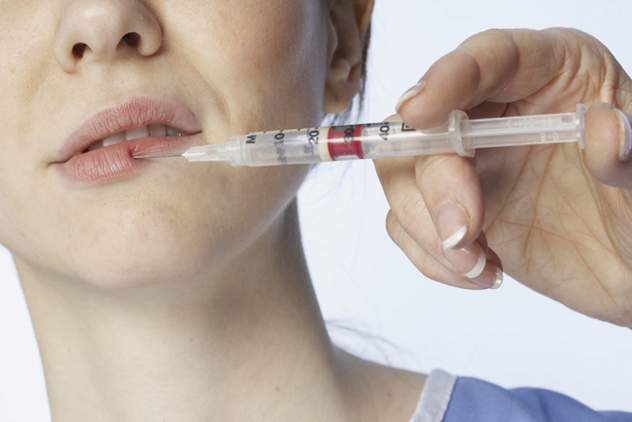
Your mouth is a weird place. Not only is it home to possibly 72 varieties of bacteria, it also produces one of the most powerful painkillers known to man. Your saliva is rich with a substance called opiorphin: a painkiller six times more powerful than morphine.
Opiorphin works by protecting chemicals called enkephalins. Basically, enkephlains keep pain signals from reaching the brain. When they break down, those signals scream up the nervous system and sound the alarm bells. Opiorphin stops enkephalins from dissipating and prevents the body from freaking out.
To test opiorphin’s effectiveness, researchers at the Pasteur Institute of Paris injected rats with a painful chemical. Afterwards, they applied the opiorphin and watched as the rats stopped licking their wounded paws. Next, scientists injected a few animals with morphine and a few with opiorphin. The unlucky rats were then made to walk across a bed of needles. It turns out rats injected with one milligram of opiorphin per kilogram of body weight couldn’t feel the pinpricks at all. However, the rodents needed three milligrams of morphine to numb their paws against the needles. That’s a pretty huge difference.
While opiorphin is still being tested, scientists are pleased with the results so far. Not only is opiorphin more effective than morphine, it doesn’t have any of the addictive side effects. Researchers think it might also work as an antidepressant. If opiorphin lives up to the hype, it could revolutionize medicine. It would also be ironic that humans have looked for ways to alleviate pain for millennia, and the whole time the answer was inside our mouths.
6Cell Phones Make You Slobber
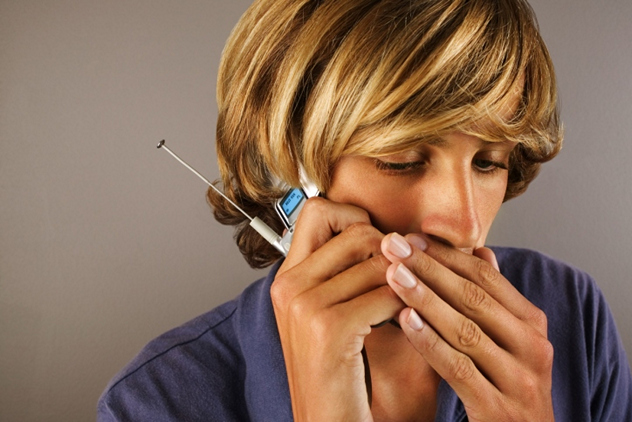
If you ever see someone foaming at the mouth, don’t panic. Sure, maybe he’s lost his mind and wants to rip your face off. Or maybe he’s just been talking on his cell phone for too long.
According to researchers at the Vidya Shikshan Prasarak Mandal’s Dental College and Research Centre in India (that’s a mouthful), people who spend a lot of time on their phones drool more than people who don’t. In 2012, scientists split 142 participants into a heavy phone user group and a control group. Heavy users talked on their phones for over two hours a day, while folks in the control group were a bit more restrained.
During the study, some unlucky scientists had to record the flow of saliva in the volunteers’ parotid glands. Found in both cheeks near the ears, these organs are the largest salivary glands in our bodies, and scientists noticed that the heavy cell phone users had larger-than-average glands, with higher levels of blood flow. Not only that, they were slobbering like Old Yeller. Heavy cell phone users were generating 26 percent more spit in the cheeks where they placed their cell phones than their control group counterparts.
Of course, scientists noted that this correlation doesn’t imply cause-and-effect. However, they also pointed out that electromagnetic radiation, emanating from the phones, could cause parotid glands to bulk up big time and produce seas of saliva. So perhaps you should clean your phone more often, or maybe you should just text.
5Introverts Salivate A Lot

There are two kinds of people in the world: extroverts and introverts. The two rarely cross paths, because the introverts are usually too busy hiding. Well, at the very least, introverts often have a hard time talking to others, and when they do, their brains react pretty strongly.
The reticular activating system (RAS) is the part of the brain that answers to social contact. The theory goes that introverts have more activity going on in their RAS than extroverts. In fact, scientists believe an introvert’s RAS is aroused much more easily than an extrovert’s. So when introverts interact with other humans, their RAS panics a bit. The only way to calm it down is to get away from those unpleasant external stimuli (aka other people).
But the RAS is a busy bunch of connected nuclei, and holds a second job. In addition to controlling social skills, it’s also in charge of how much we salivate. And, thanks to the RAS, researchers can determine if you’re outgoing or introspective, based on how much spit your mouth makes. All they need is a lemon.
In 1967, Professors H.J. and Sybil Eysenck of the University of London Institute of Psychiatry performed a citrusy experiment on 100 volunteers. They squeezed lemon juice on their volunteers’ tongues, and watched as their mouths watered. Obviously, that’s going to happen whether you’re a talk show host or a hermit, but the Eysencks noticed that introverts salivated far more than extroverts. In fact, when people at the BBC conducted their own experiment, they found their shy subjects created 50 percent more saliva than their gregarious participants. That’s because an introvert’s RAS is just so busy. It overreacts in social situations, as well as during salivary production. So perhaps it’s a good thing that introverts keep their mouths closed most of the time.
4Saliva Can Reveal Your Age
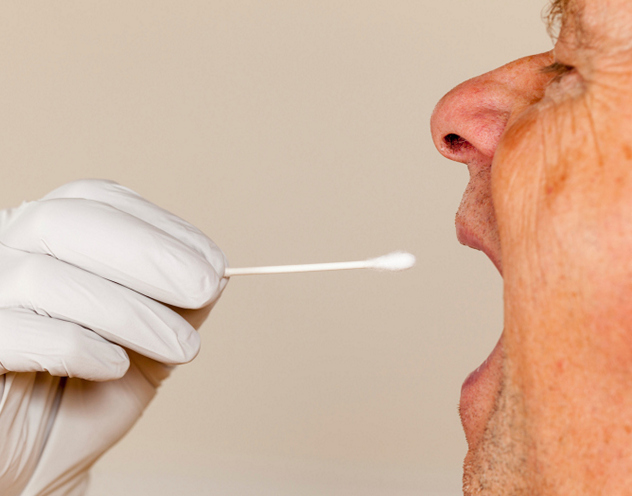
It’s hard to be a crook these days. In this age of increasingly crazy police technology, criminals have to watch their every move, or they’ll end up in the slammer. Now, thanks to researchers at UCLA, bad guys have another reason to long for a time before CSI. It turns out their own spit can rat them out.
The DNA in our saliva changes over time. As we age, our DNA undergoes a process called methylation. This chemical process activates certain genes and shuts others off, based on environmental factors like diet. Essentially, as we get older, methylation changes the way our genes express themselves. Bearing that in mind, UCLA researchers analyzed the DNA of nearly 130 people. By focusing on two genes most affected by the change, scientists could peg a person’s age to within five years. That’s pretty darn accurate.
Obviously, this would seriously aid detectives trying to track down culprits, but this finding could help doctors as well. Strangely, our DNA’s age, known as biological age, doesn’t always match up with our chronological age. (That’s why scientists can only narrow age down to a five year gap.) If doctors knew someone’s biological age—their true age—they could better decide what treatments patients should receive and more effectively combat age-related sicknesses. It’s a discovery that helps everybody, except crooks who’ll have to start carrying spit cups to crime scenes.
3Vampire Bat Saliva Might Help Treat Strokes

Quite a few people—from vigilante billionaires to pet detectives—suffer from chiroptophobia: fear of bats. Vampire bats are especially despised, but perhaps all that hatred is misplaced. Sure, they drink blood, occasionally carry rabies, and look like demons from hell, but their spit might save your life someday.
Vampire bat saliva is full of an enzyme called desmoteplase (DSPA). Whenever one of these winged terrors feeds on an unsuspecting victim, DSPA keeps the blood from clotting, allowing the vampire to gorge to its heart’s content. But don’t call in Van Helsing just yet. While DSPA might sound gross, scientists think it could actually be used to help stroke patients.
Nearly 87 percent of strokes in the US are ischemic strokes. That’s when blood clots form in vessels in the brain, preventing the spread of oxygen. Ischemic strokes are serious business and can result in paralysis, speech problems, and death. However, treatment can get a bit tricky. Currently, doctors use a protein called tissue plasminogen activator (tPA) to break up blood clots, but if it isn’t applied within three hours of the stroke, tPA can cause serious brain damage. Sadly, most patients don’t receive tPA, as they wait too long to go to a hospital.
Enter vampire bat saliva. Researchers at Monash University in Australia ran a series of tests on lab mice, comparing the effects of DSPA to rt-PA (a recombinant form of tPA). Not only was DSPA more efficient at disintegrating blood clots, it was a whole lot safer. Scientists concluded that doctors could administer the vampire bat enzyme up to nine hours after an ischemic stroke without any risk of brain damage. DSPA has yet to hit the market as it’s still being tested, but if it does, you’ll know it by an extremely creepy name—Draculin. Bram Stoker would be proud.
2Parents Have Super Spit
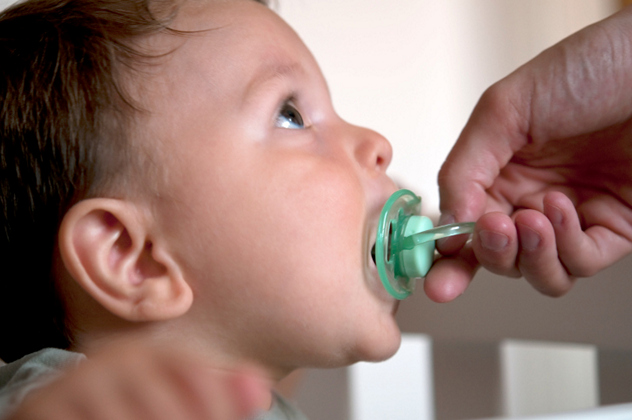
Pacifiers are a parent’s best friend . . . or worst nightmare. While they keep weepy children from screaming all day long, they’re also crawling with germs, especially when kids drop them on the ground. When most parents see their baby’s pacifier lying on the floor, gathering all sorts of killer germs, they simply wash it off under cold water. However, there are a few moms and dads who skip the trip to the sink. Instead, they pick up the pacifier, stick it in their mouths and suck off the dirt.
That may sound sick, but researchers at the University of Gothenburg believe pacifier-sucking parents inoculate their children against allergies. In a study that involved 65 babies, Swedish scientists compared kids whose parents washed their pacifiers to those who licked them clean. Surprisingly, kids with the spit-shined pacifiers were far less likely to get eczema or asthma.
Researchers believe when parents orally clean pacifiers, they’re transferring some of their own harmless bacteria into the baby’s mouth. These seasoned microbial vets have seen an infection or two and know how to fight off diseases. When they’re introduced into the baby’s microbiome (basically, the community of microorganisms in our bodies), they whip the immune system into shape like a drill sergeant training green troops. They also teach the baby’s system to keep calm around cats and peanuts. So while it seems icky, moms and dads who suck on pacifiers are actually doing their kids a big favor. Any parents out there inspired?
1The Illegal Saliva Trade
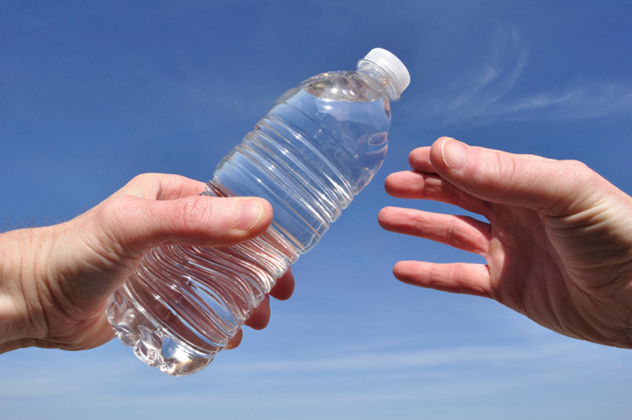
Need an odd yet illegal specialty item? Well, you’re in luck, because there are plenty of crooks waiting to take your order. We’ve already learned about criminals who deal in sperm, bear parts and python skins, but South Africa is home to a unique group of thieves who are just drooling to do business.
Tuberculosis is a major problem in South Africa. Half a million people are diagnosed every year, and—thanks to problems like malnutrition and HIV—the disease is spreading rapidly. The government offers a monthly disability grant to help TB patients get by, and that’s where the criminals come in.
As of late 2013, South Africa’s unemployment rate was 24 percent. With so few opportunities available, some desperate folks decide to scam the government. Hoping to cash in on the medical grants, healthy people turn to spit dealers, crafty TB victims who sneak into health clinics and “borrow” a few bottles meant for sputum samples. The thieves spit inside the containers and sell their saliva for about US$4.61–$9.21 (R50–100). The buyers then hand in their contaminated samples at clinics. It’s standard procedure for staff to watch people produce their saliva, but hospitals are often so swamped with actual patients that doctors don’t have the time. They’re in such a rush that they just take the fake bottles, run a few tests, and come back with a not-so-clean bill of health for the happy patient.
The illegal saliva trade is a pretty disgusting racket, but dealers make enough to get by. In 2009, one guy earned US$46 (R500) a month slinging spit on the street. Of course, competition is pretty intense. Tuberculosis is so rampant in South Africa that there are spit dealers everywhere. After all, they carry their labs around in their mouths.
While writing this list, Nolan Moore became very conscious of all the saliva in his mouth. He also thought a lot about The Outlaw Josey Wales. If you want to drop him a line (Nolan, not Josey), you can email him here.



